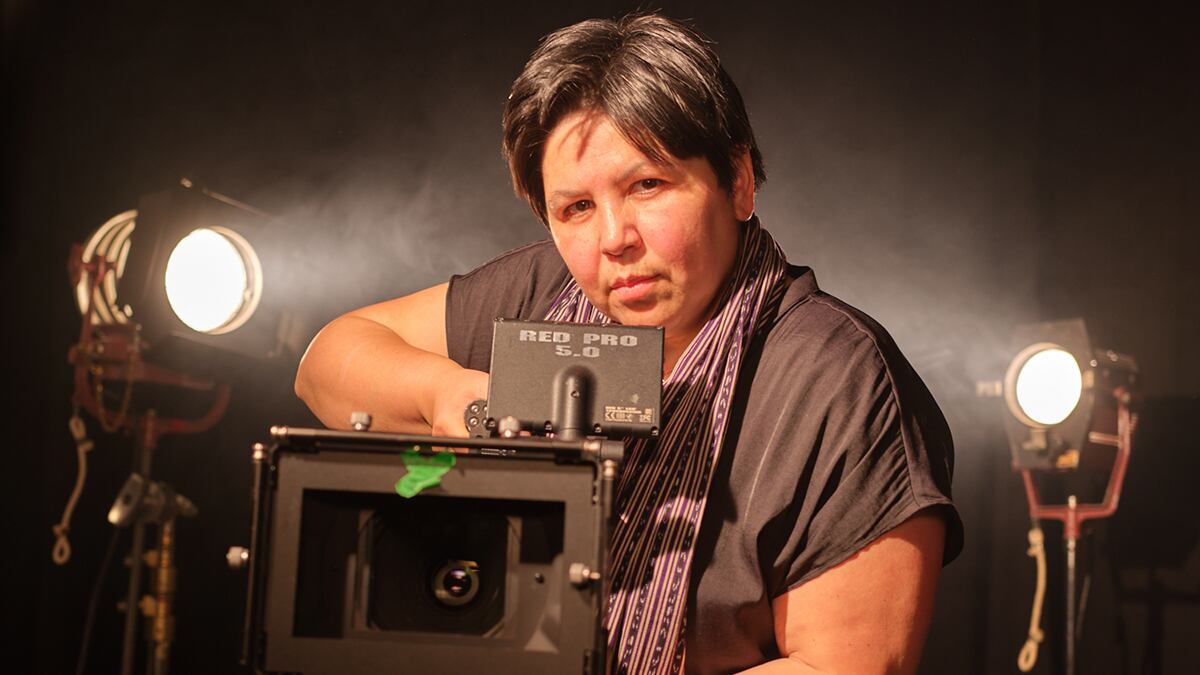As a former carpenter, the queer, Mexican American director Dawn Jones Redstone is used to building things from the ground up. That skill set was put to good use as she navigated the making of her first feature length film, Mother of Color, about a woman who begins receiving messages from the beyond.
Originally from San Antonio, Texas, Jones Redstone has been fascinated with movies since childhood.
“I have always been a cinephile,” she says. “I grew up watching movies. My dad would bring home stacks of VHS tapes and take us to go see art-house cinema, when no one was taking a 10-year-old to the art house in San Antonio, Texas.”
Despite Jones Redstone’s passion, it wasn’t until much later in life that she pursued it. “I had an inkling and curiosity about it while at the University of Texas,” she says, but she set film aside as she cultivated a career in carpentry.
After buying her first camera and taking her first class on filmmaking in 2003, she participated in her first film festival. “Viewing the world through that kind of way, that you could make something and people will watch it, allowing you to connect with them, was a powerful moment,” she says.
During her carpentry days, Jones Redstone served as a mentor to other women in the industry. While working at Oregon Tradeswomen Inc., she provided job training, covering both tangible aspects of the job, like using tools, as well as discussing topics like believing in yourself and battling discrimination.
Since the work often required these women to do things they didn’t realize they were capable of, Jones Redstone would speak to them about the importance of taking a leap of faith. Eventually, she took her own advice and started a film production company, garnering success with short films that often incorporated the issues that marginalized populations face—sexism, racism and discrimination.
“I always prioritize the telling of the story first, but by the story I choose to tell, and how, is a form of activism,” she says, adding, “There are things about every film I’ve made that are subconscious, that I don’t notice until later that’s about something that happened to me. I don’t always understand it until after the process of editing.”
Jones Redstone, who is largely self-taught from YouTube videos and stacks of books, isn’t holding back with her feature debut. Mother of Color, which will have been a three-to-four-year endeavor by the time it’s complete, features special effects and 18 cast members. And it marks the first time that Jones Redstone has taken on the role of writer, director and executive producer.
The film follows the life of Noelia (Ana del Rocío), a community organizer and single mother of two who faces difficult decisions regarding her career and her children. When presented with an opportunity that could change everything, she begins receiving messages from her ancestors, leading to a meditation on the film’s defining themes: child care and disconnection from your own body.
“The first main theme is the way our society devalues caregivers,” Jones Redstone says. “This is something the pandemic has shined a spotlight on. Child care basically makes all other work possible. You see her over the film and what [Noelia] goes through.”
As for being disconnected from your body, Jones Redstone says: “When we allow ourselves to feel, there is a certain healing that takes place. That’s necessary to find out who we really are. When we are our authentic selves, especially as someone who might’ve been part of a marginalized society, it can change the world.”
Since her first short film, Jones Redstone has prioritized inclusivity. With Mother of Color, which will premiere this fall, she continued that tradition by having mostly women of color on set. After all, choosing who to hire can be an act of healing—another theme that reverberates throughout the story.
“The film ultimately asks us all to consider how we can acknowledge our wounds, but still move forward in our lives,” Jones Redstone says.
In other words, Mother of Color reflects what she tells herself and other filmmakers: ”If we want our stories told, we have to tell them ourselves.”
Read about all Five filmmakers who are reshaping the cinema of the Pacific Northwest here!
